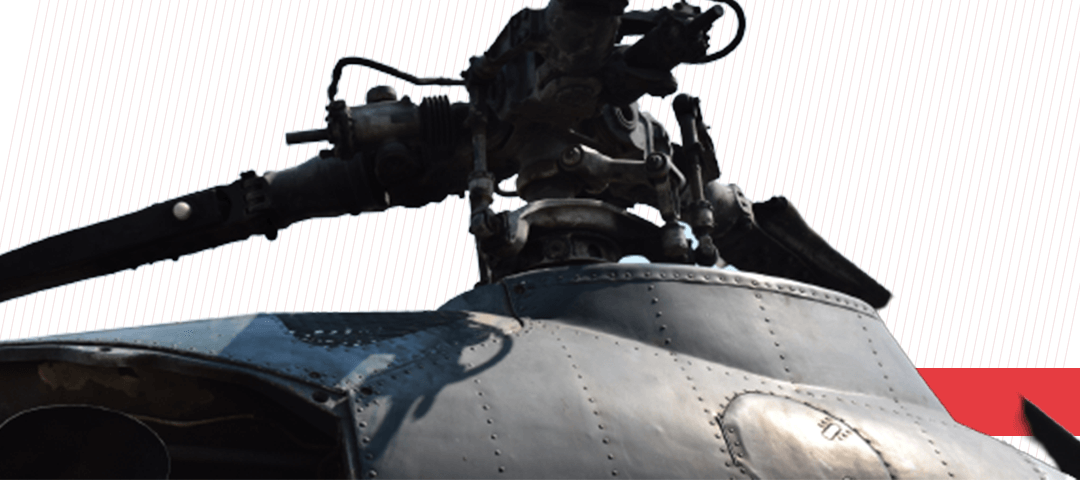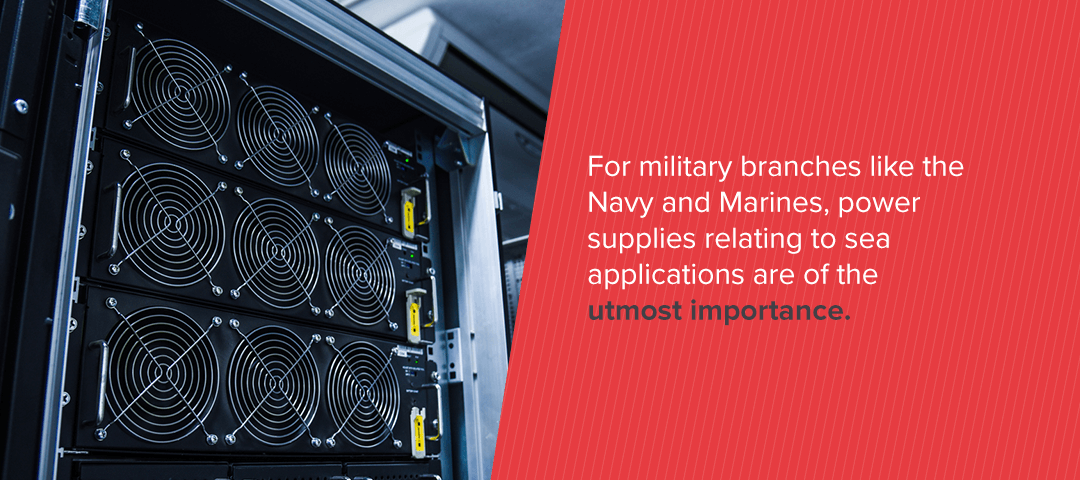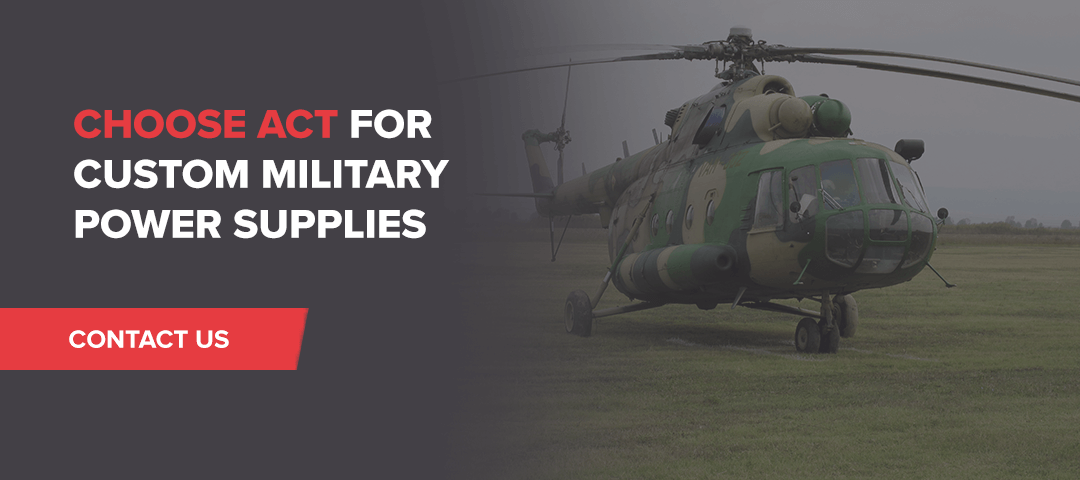
The United States military accomplishes various tasks worldwide to maintain the security of the nation and the territories it protects. Many kinds of gear are required to accomplish the military’s goals, and what is inside some of that gear must meet rigorous standards to ensure success. Overall, military power supply importance cannot be understated, making it crucial for engineers to understand its ins and outs.
What Is a Military Power Supply?
Generally, military power supplies provide AC or DC power to various equipment and tools the military requires for its operations. Due to the critical nature of military applications, the sector’s power supplies must align with department regulations and application-specific requirements. In other words, the military needs access to more comprehensive power supplies than most other industries.
Many processes in the military demand highly durable and reliable power capabilities. Therefore, while military power supplies can be similar to systems used by organizations in other domains, they must feature specialized components to meet the military’s exceptional requirements. These power supplies should hold up in harsh weather, stay intact amid rugged environments, and deliver consistent power levels for long periods.
Why Is a Military Power Supply Important?
It goes without saying that the military completes numerous crucial tasks every day. For example, individuals in the Navy have to travel hundreds of miles in ships across bodies of water as well as fly precision aircraft that takes-off and lands on carrier decks and runways, and Air Force teams need to manage flight support missions sometime for many hours and great distances. These duties can be challenging and occur in diverse environments, meaning the technology needed daily must be long-lasting, stable, and flexible.
Without robust, well-made power systems, military branches would not be able to succeed in the following areas:
- Defensive and offensive security: The military’s purpose is rooted in providing security, both to the United States and entities abroad. In order to provide high-level security to the territories it protects, military branches rely on uniquely designed power systems for their devices and equipment.
- Mission command/communication: When teams complete missions in the field, proper communication plays a significant role in the task’s success. A faulty piece of equipment made with inadequate power systems could lead to damaging outcomes, which is why the military must employ specialized power supplies.
- Intelligence: Gaining intelligence is vital to provide guidance in numerous situations. Whether it is general intelligence or more pertinent intelligence for battle, technology powered by military-grade supplies can be a factor in the process’s success.
- Weapon systems: Thanks to advanced power systems, the military can operate its vast array of weapon systems, ensuring teams can accomplish tasks and provide crucial defense services.
From handheld communications devices to entire aircraft, military teams should implement the right power systems in their technology to fulfill all of the above applications and more.
How Are Military Power Supplies Used?
The military has always relied on technology. In today’s world, advancements have made electronics even more pertinent to successful military operations. Whether it be a handheld radio or a submarine, all kinds of military devices require high-quality, specialized power supplies.
As stated, every military branch operates in various conditions and settings. In that way, the use of power supplies differs across the industry making it more important for engineers to determine if power supplies will meet environmental standards. For further context about how the military often employs power supplies, we can break down common applications into three categories based on environment — ground, sea, and air:
1. Ground
From light armored vehicles to self-propelled artillery, Army teams must navigate various land environments with the right gear. Further, gear such as communications equipment is frequently used on military sites. Beyond using the correct vehicle or device for the situation, individuals need to be able to trust the power supplies in said equipment.
Therefore, power supplies meant for ground environments should:
- Withstand extreme temperature increases and decreases.
- Hold up against snow, dirt, and sand.
- Provide water resistance.
- Be compact to provide space for other components.
- Work correctly despite vibrations or shocks.
Military power supplies used in ground vehicle applications often need to meet the electrical characteristics listed in MIL-STD-1275.
2. Sea

For military branches like the Navy and Marines, power supplies relating to sea applications are of the utmost importance. All bodies of water offer a complex environment, so the power supplies in vessels like aircraft carriers, destroyers, submarines and others must be able to accommodate varying elements. While water resistance is a clear must-have feature, power supplies in sea equipment should also:
- Stay operational amid fluctuating temperatures.
- Mitigate vibrations and shocks.
- Protect against radio frequency interference.
Note that sea power supply applications must align with MIL-STD-1399-300, the electric power requirements for military shipboard equipment.
3. Air
In branches like the Air Force as well as the Navy, where teams spend hours in the sky, the necessary power supplies have to meet a strict set of standards. Unlike ground environments, aircraft experience exposure to fluctuating altitudes, which is a notable aspect power supplies must circumvent. Whether on a jet or in a helicopter, power supplies for air-based applications need to satisfy military aircraft electric power standards — MIL-STD-704 — and do the following:
- Endure high altitude.
- Function despite high- and low-temperature extremes.
- Offer water, vibration, and shock resistance.
- Deter radio frequency interference and electromagnetic interference.
When designing and implementing power supplies for any of the above categories, said power supplies undergo tests to ensure they can meet the necessary requirements for both the equipment itself and the military’s standards.
Other Applications for Military Power Supplies
When reviewing the above uses for military power supplies, you will likely note their extensive benefits. As stated, said power supplies must meet diverse conditions, offering durability, longevity, and reliability. These elements create the ideal power supply for a range of military equipment, but that does not mean military supplies are limited to use by the military.
Using military power supplies in non-military applications can be highly effective, given their capabilities. These power systems are extremely high-quality and dependable, making them an excellent option for devices used outside of the military. If you choose military power supplies, you can rest assured they have undergone comprehensive testing, can hold up in various settings, and operate diligently without requiring much maintenance.
Choose ACT for Custom Military Power Supplies
Whether you require military-grade power supply solutions for military or non-military applications, Advanced Conversion Technology (ACT) can provide you with custom options that meet your needs. Since 1981, we have worked hard to deliver the most comprehensive AC-DC and DC-DC military power supplies you can trust to get the job done. With ACT products, you can rest assured your devices will offer optimal performance in various environments and settings making us a great power supply partner. ACT also offers military-grade COTS power supplies.
Browse our products or submit a product request today to partner with us.
